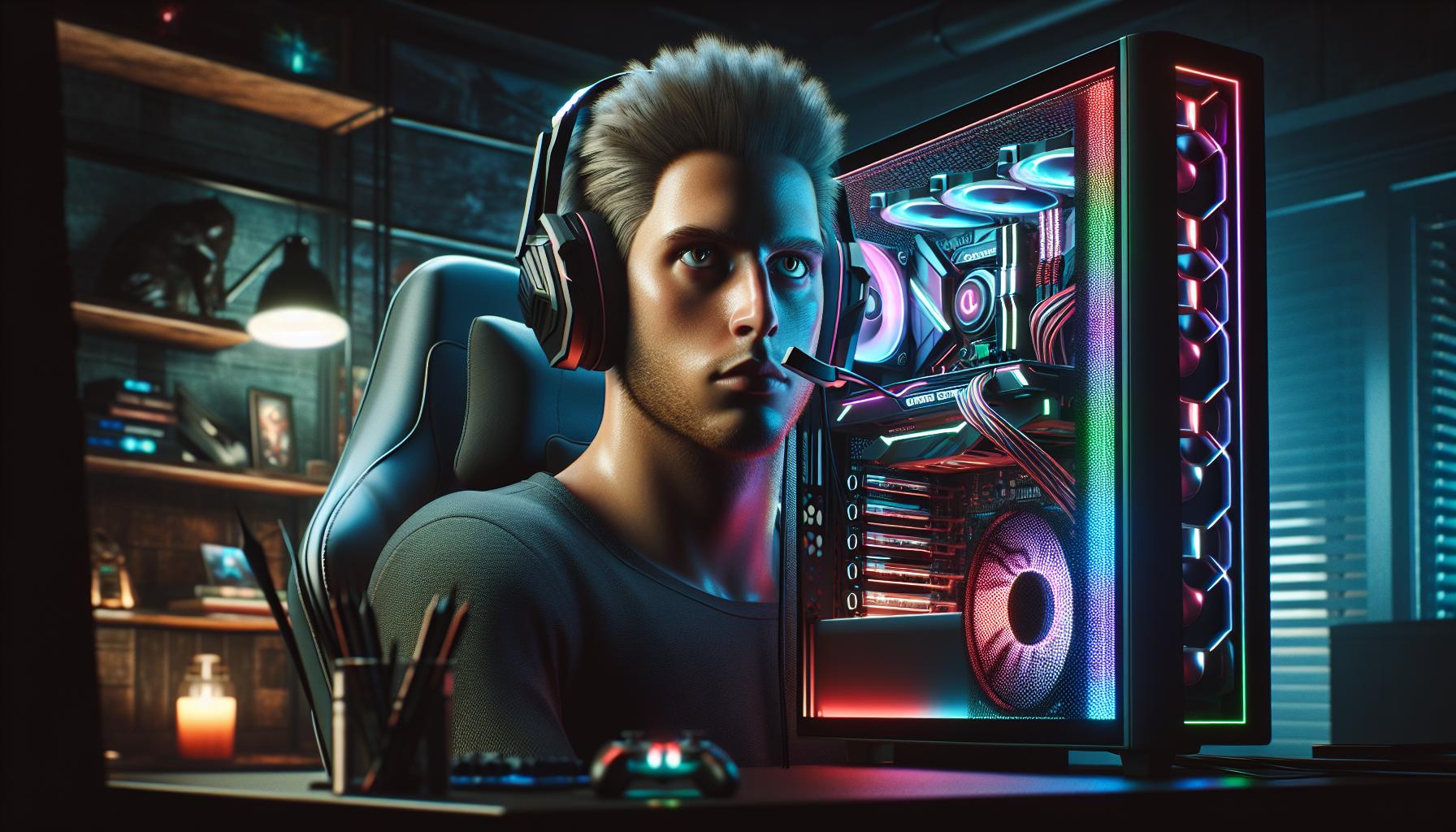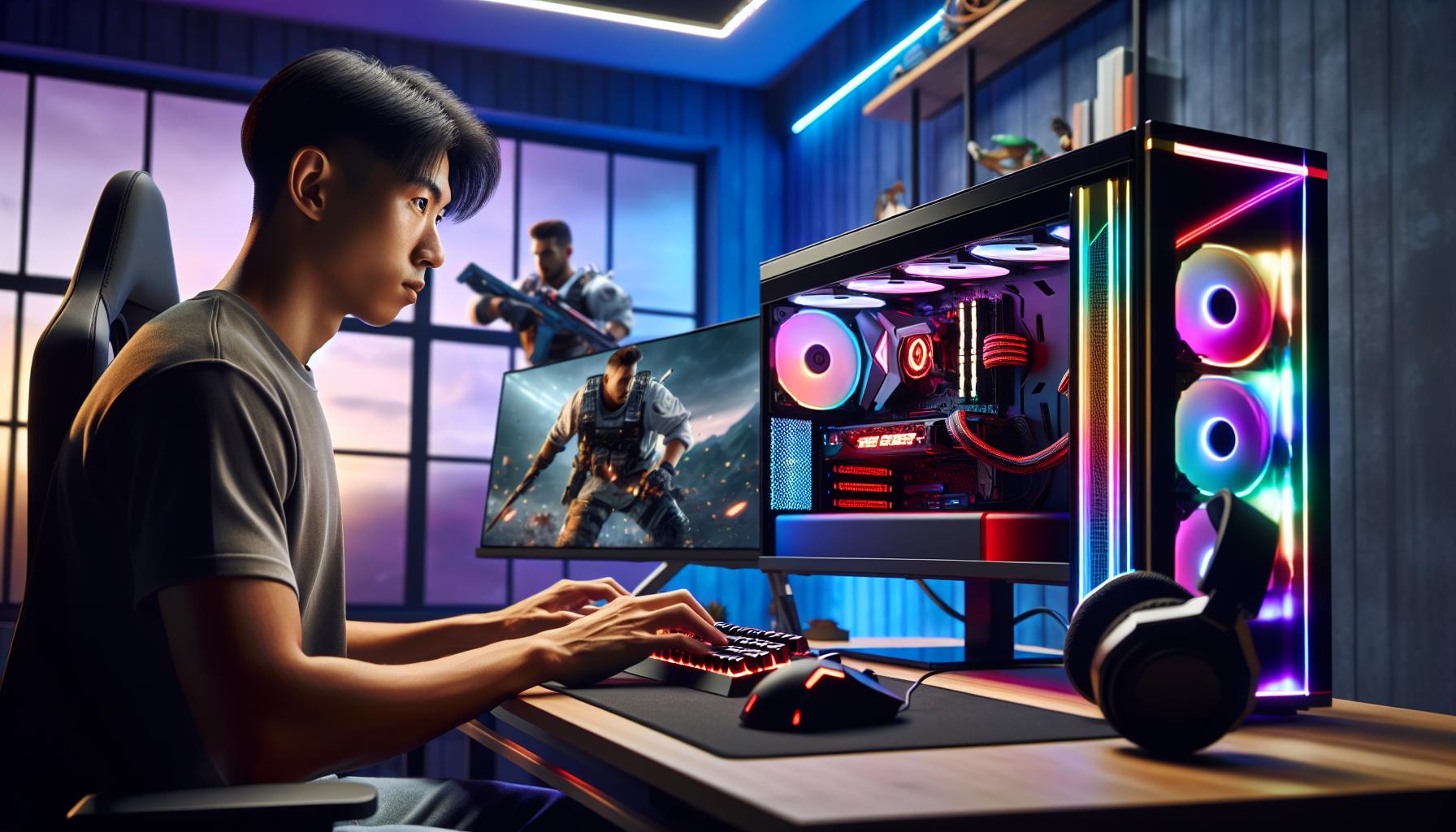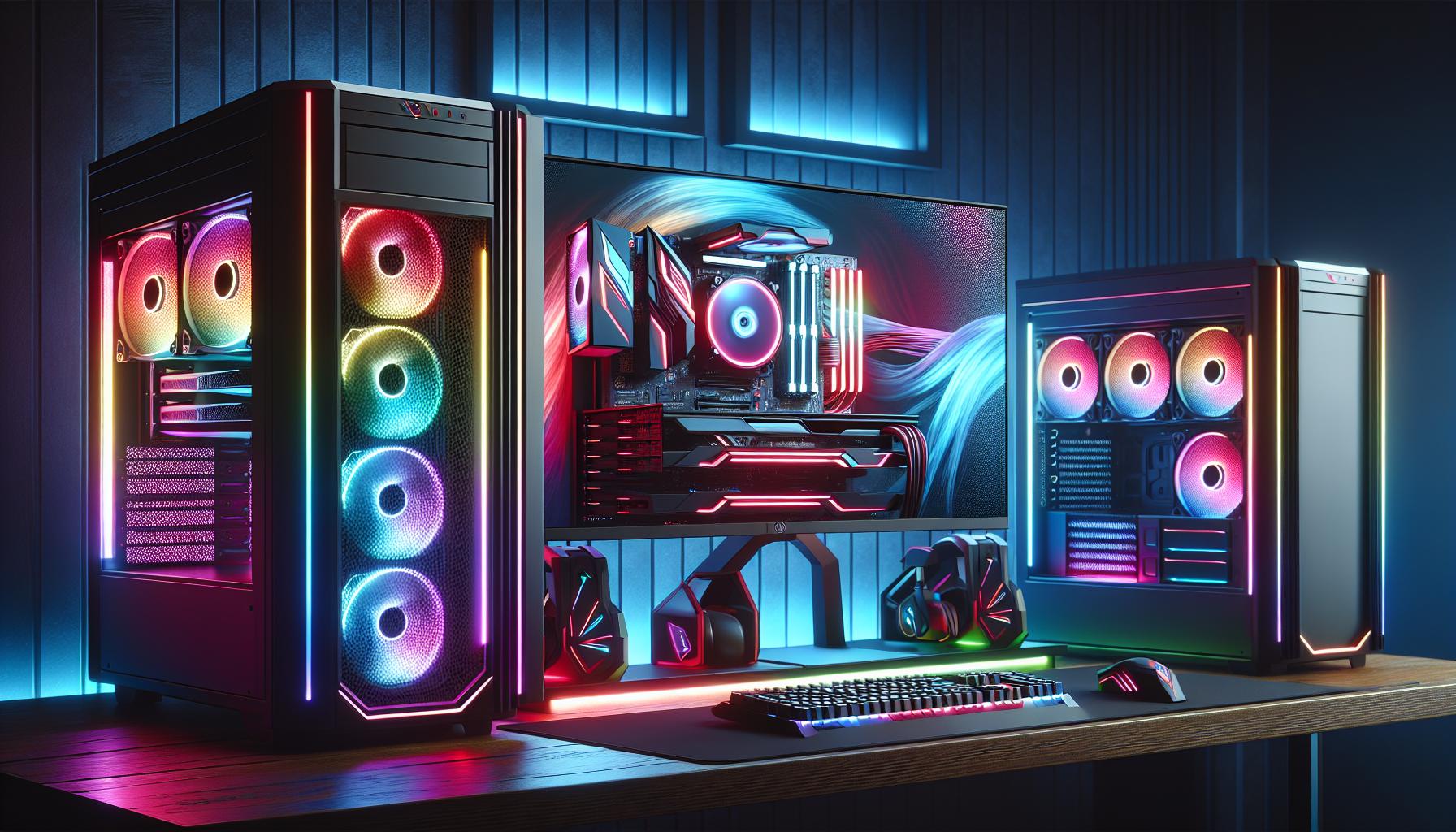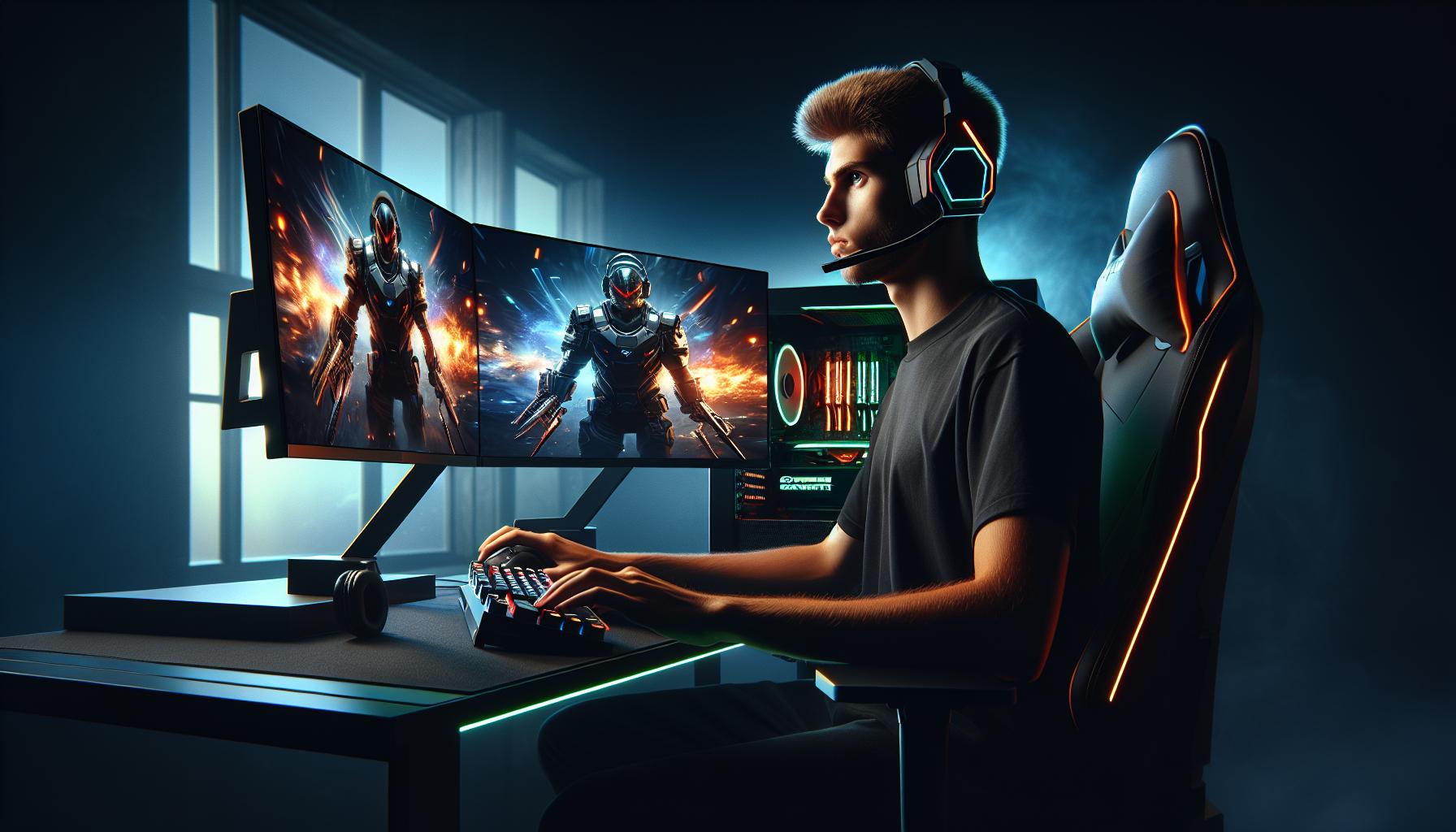
In the world of esports, having the right gaming PC can be the difference between glory and a quick trip to the respawn screen. Picture this: you’re in the heat of battle, adrenaline pumping, and your PC decides it’s the perfect moment for a meltdown. Talk about a buzzkill! To truly dominate the competition, players need a rig that’s as fierce as their skills.
Esports Essential Gaming PC
An esports essential gaming PC combines high-performance components that enhance gameplay experiences. Players prioritize speed, reliability, and graphical prowess when selecting a system. Essential components include the CPU, GPU, RAM, and storage, which contribute to overall performance.
High-end processors facilitate faster calculations and quicker response times, critical in competitive scenarios. Modern GPUs provide realistic graphics and higher frame rates, ensuring smooth visuals during gameplay. Ample RAM allows for seamless multitasking, enabling players to run multiple applications without lag, which is crucial for streaming and communication during matches.
Storage devices play a significant role in loading times. Solid State Drives (SSDs) speed up game launches and level transitions, reducing downtime. A minimum of 512GB SSD space is recommended, with additional HDD storage for less frequently played titles.
Cooling systems help maintain optimal temperatures, preventing thermal throttling during intense gaming sessions. Liquid cooling solutions are favored for high-performance builds, offering efficient heat management while minimizing noise levels.
Building a gaming PC tailored for esports requires careful consideration of all components. A balance of performance, reliability, and budget creates an effective rig. Players often seek systems that exceed recommended specifications for popular games, ensuring they stay competitive.
When assembling the perfect gaming setup, monitor quality also matters. High refresh rates and low response times enhance visual clarity and responsiveness, impacting player performance. Investing in peripherals, such as quality mice and keyboards, further elevates the gaming experience.
Ultimately, the right esports essential gaming PC defines how players perform in competitive environments. Recognizing the critical role of hardware leads to informed selections that enhance gameplay and strategic advantages.
Key Specifications to Consider

Selecting the right specifications for an esports essential gaming PC ensures optimal performance. Key components are crucial for delivering a competitive edge.
Processor Performance
Performance of the processor significantly influences overall gaming experience. High-performance CPUs, such as AMD Ryzen or Intel Core i7/i9, enable faster calculations, which directly affects in-game responsiveness. Multiple cores and threads allow multitasking without lags, improving gameplay during intense moments. Gamers prioritize clock speeds exceeding 3.5 GHz for optimal performance during competitive matches. High-end processors can also handle streaming and recording simultaneously without drops in frame rates.
Graphics Card Importance
Importance of the graphics card cannot be overstated in esports gaming. Modern GPUs from NVIDIA or AMD must provide high frame rates and realistic graphics. Players often choose cards like the NVIDIA GeForce RTX 3060 or AMD Radeon RX 6700 XT to achieve smooth visuals and enhance immersion. Support for technologies like Ray Tracing elevates graphic fidelity, contributing to an enriched gaming experience. Compatibility with high-refresh-rate monitors amplifies player performance by reducing input lag in competitive settings.
RAM and Storage Requirements
Adequate RAM and storage play vital roles in maintaining system efficiency. A minimum of 16GB RAM enhances multitasking capabilities, allowing users to run games and applications smoothly. Fast storage solutions like SSDs cut down loading times significantly, with 512GB recommended to house multiple titles. Additional HDD storage provides space for less commonly played games without compromising performance. Efficient data management improves overall gameplay experience, ensuring quick access to content during matches.
Popular Esports Essential Gaming PC Models

Several gaming PC models stand out in the esports arena. These systems are designed to deliver high performance and reliability.
Model Comparison
Top models include the Alienware Aurora R13, Corsair Vengeance i7200, and MSI Trident 3. The Alienware Aurora R13 offers a powerful Intel Core i9 processor and NVIDIA GeForce RTX 3080, making it ideal for high-intensive gaming. In contrast, the Corsair Vengeance i7200 features customizable components, catering to varied gaming preferences. Lastly, the MSI Trident 3 presents a compact form factor without sacrificing performance, housing an AMD Ryzen 7 processor paired with a capable Radeon RX 6700 XT. These comparisons highlight essential features that players should consider for optimal gaming experiences.
Price Ranges and Performance
Price ranges vary widely among these models. The Alienware Aurora R13 starts at approximately $2,000, while the Corsair Vengeance i7200 can be configured for around $1,800 to $3,000 based on specifications. The MSI Trident 3 offers a competitive entry point, starting around $1,300. Performance correlates with price; higher-priced models typically feature advanced GPUs and processors. Investing in a mid-range to top-tier model can significantly enhance gameplay and deliver smoother experiences. Selecting the right model involves evaluating both budget and required performance.
Building vs Buying an Esports Essential Gaming PC

Choosing between building and buying a gaming PC affects performance, cost, and personal preferences. Each option presents distinct advantages for gamers.
Advantages of Building a Custom PC
Building a custom PC allows for tailored specifications that meet specific gaming needs. Gamers can select high-performance components such as AMD Ryzen CPUs or NVIDIA GPUs. Customization extends to cooling systems and storage, enabling superior heat management and quick load times. Personal satisfaction often accompanies the process, as assembling parts enhances familiarity with hardware. Cost-effectiveness also plays a role, as selecting components strategically can yield savings compared to pre-built systems. Warranty options vary, but individual parts often come with service guarantees, providing peace of mind for users.
Benefits of Pre-Built Options
Pre-built gaming PCs offer immediate convenience for gamers. These systems come fully assembled, eliminating the time and effort required for DIY building. Manufacturers typically ensure compatibility among components, reducing the risk of performance issues. Best-selling models, like the Alienware Aurora R13 or Corsair Vengeance i7200, come with performance guarantees, showcasing high specifications suited for esports. Limited setups also benefit from extensive customer support, helping users address technical problems quickly. Price transparency simplifies budgeting, allowing gamers to compare costs more effectively.
The Difference Between Victory And Defeat
Investing in an esports essential gaming PC isn’t just about having the latest components; it’s about ensuring peak performance during crucial moments. A well-assembled rig provides the speed and reliability needed to outplay opponents and minimize technical setbacks.
From powerful CPUs to high-end GPUs and ample RAM, each component plays a pivotal role in enhancing gameplay. Whether choosing to build a custom system or opt for a pre-built model, the right choices can lead to significant advantages in competitive gaming.
Ultimately, a solid gaming PC can be the difference between victory and defeat, making it an indispensable tool for any aspiring esports athlete.
